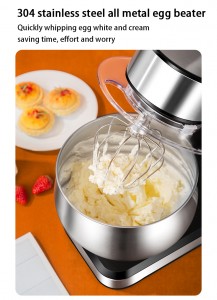do i need a hand mixer and a stand mixer
Kitchen appliances play a vital role in our lives, making cooking and baking more convenient and efficient. When it comes to mixers, two popular options are hand mixers and stand mixers. If you’re an avid baker or someone who likes to experiment in the kitchen, you might be wondering if you really need both. In this blog, we’ll explore the pros and cons of owning a hand mixer versus a stand mixer to help you make an informed decision.
Advantages of hand mixers:
1. Convenience: The handheld mixer is light in weight, compact in structure, portable, easy to store and operate. They’re great for small tasks like beating eggs, whipping cream, or mixing cake batter. Its handheld design provides flexibility, allowing you to easily move the mixer around the bowl or pan.
2. Affordable: Hand mixers are often less expensive than stand mixers, making them ideal for those on a tight budget. If you only bake occasionally or have little counter space, a hand mixer offers excellent value for money.
3. Versatility: The hand mixer comes with a variety of attachments, including beaters, dough hooks, and beaters, allowing you to perform a variety of tasks. Some models even feature turbocharging for extra power. With a hand mixer, you can easily whip up desserts, knead dough, or mix liquids.
Advantages of stand mixers:
1. Power and Capacity: Stand mixers are known for their powerful motors and large mixing bowls, making them ideal for large batches or heavy-duty tasks. They handle thick doughs or stiff batters with ease, and often mix ingredients more evenly than hand mixers.
2. Hands-free operation: Unlike hand mixers, stand mixers have a stable base and a tilt or lift head that holds the mixing bowl in place. This hands-free operation allows you to multitask, prep other ingredients, or even step away from the blender temporarily without worrying about it moving or spilling.
3. Built-in features: Stand mixers often come with additional accessories and built-in features, such as dough hooks, paddles, and splash guards. Some models even come with optional accessories like a pasta maker or meat grinder, adding to the versatility of the unit.
Disadvantages of both blenders:
1. Space: Both hand mixers and stand mixers require storage space in the kitchen. Having two blenders may not be practical if you have limited counter or cabinet space.
2. Cost: Owning both a hand mixer and a stand mixer can be expensive. It’s important to consider your budget and how often you’ll be using each device before making a purchase.
In conclusion, the decision to have a hand mixer or a stand mixer comes down to your personal preferences, cooking habits and available space. If you make the occasional bread and are limited on space and budget, a hand mixer can meet most of your needs. However, if you bake a lot, cook for a large crowd, or like to experiment with complex recipes, investing in a stand mixer might be worth it. Ultimately, it’s important to consider your individual needs and choose the blender that best suits your needs.
